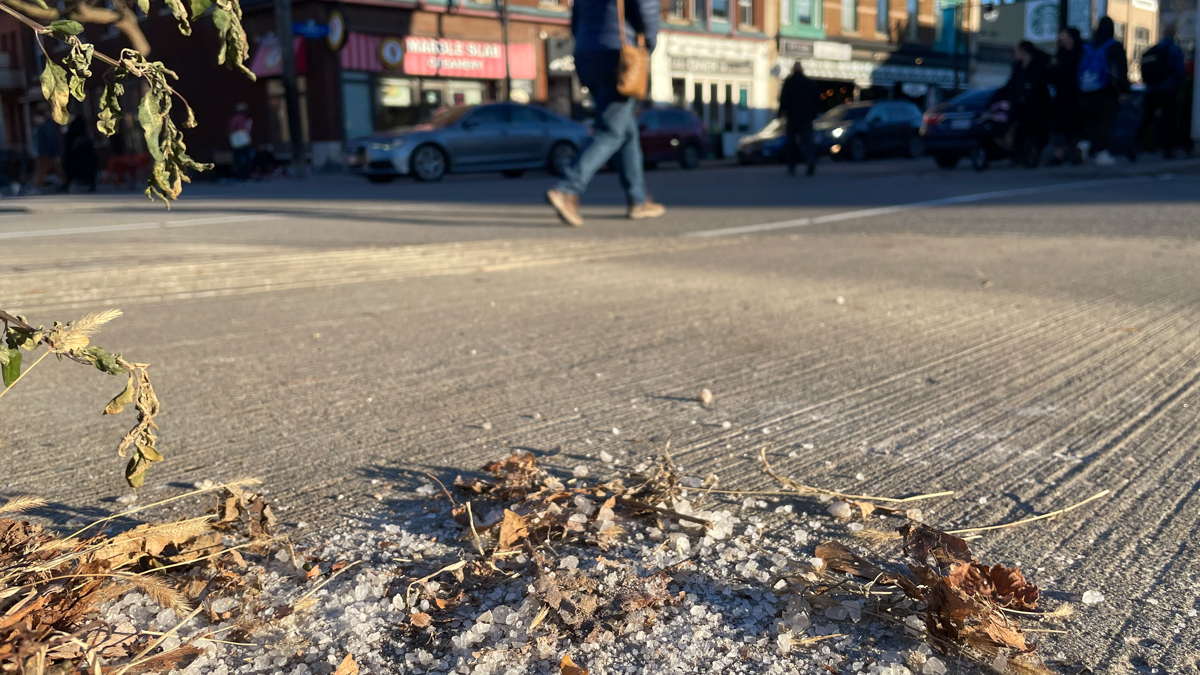The City of Ottawa will try out machines known as sidewalk controllers this winter in a pilot project to allow crews to more accurately apply and monitor the amount of road salt they apply.
Research by the Ottawa Riverkeeper has highlighted the ecological damage de-icing salt (sodium chloride) does to waterways. Since 2020, significantly higher chloride levels have been measured in urban waterways than in rural. Chloride is harmful to freshwater organisms. Much of the winter salt used on city streets, sidewalks and paths ends up in rivers and lakes.
The city said the machines under consideration are the Kugelmann Winterdienst, Bosch Rexroth 620, Epoke TPS Combi and the Parker Hydraulic.
“Heavy-handed road salt application is a serious issue in most urban zones, and its use has made some freshwater streams and waterways as saline as ocean environments,” said Michelle Woodhouse, water program manager at Environmental Defence in an email.
In Ottawa, city and contracted crews treat all sidewalks. Crews apply grit mixed with salt to the sidewalk network and on residential roads, Christopher Paquette, program manager for the city’s operational research and project unit, said in a statement to Capital Current.
“We do need a low road salt model in place for municipalities, and so the pilot project is an important micro project that is part of a larger systemic shift that needs to occur in how our urban zones manage road salts, freshwater health, and ice-related risks.”
Michelle Woodhouse, water program manager at Environmental Defence
“We do need a low road salt model in place for municipalities, and so the pilot project is an important micro project that is part of a larger systemic shift that needs to occur in how our urban zones manage road salts, freshwater health, and ice-related risks,” Woodhouse said.
In recent years, the city has also started “pre-wetting” road salt to create a brine. This process makes salt more effective in lower temperatures and also reduces the amount needed. Traditional de-icing salt is not effective in temperatures colder than -7 C, said Matthew Brocklehurst, Ottawa Riverkeeper communication manager.
The city’s pilot project comes as the Landscape Ontario Horticultural Trades Association pushes the province for a regulation of salt use to protect private contractors from legal action.
Private snow and ice management contractors are 100 per cent liable for slip and fall claims, often leading them to oversalt outdoor areas, because insurance premiums are high, said Joe Salemi, the executive director at Landscape Ontario.
Under Ontario’s Occupiers’ Liability Act, contract snow removers must ensure reasonable safety for people entering the property they are contracted to clear.
In late October, the association met with Premier Doug Ford to advocate for shifting this burden off contractors to address excess salt usage.
Salemi said the snow management contractor industry is environmentally conscious by nature.
“It’s the same companies that are planting trees and managing environmentally responsible landscapes in the warm months that are … oversalting just to protect themselves,” said Salemi.
Salemi, a board member of the Smart About Salt Council, which provides educational resources on salt use, emphasized the need to use only the proper amount of salt. For example, it takes about one coffee mug full of salt to de-ice a standard driveway, according to the Ottawa Riverkeeper.
Salemi said new rules could also legally protect small businesses looking to cut their use of salt for the environment. Keeping customers safe remains a central concern for these entrepreneurs.
“At the end of the day, what we’re trying to do is put in [protective] standards for snow and ice management, and that could apply to those small businesses and shop owners that have to deal with their own snow clearing for their storefronts,” Salemi said.
Salemi said even if businesses hire outside snow management contractors, they are responsible for keeping their entries free of snow and ice.
Shovelling salt
Luca De Marinis, an assistant manager at Knifewear Ottawa in the Glebe, says staff shovel and apply salt to the store’s front step.
“We just want to make sure that we can get in and out of the store and customers can get in and out of the store without falling over,” De Marinis said.
Cory Hackett, the owner of Top of the World skateboard shop, said instead of using salt, staff use skateboard grip tape on the part of the shop’s entrance exposed to snow to prevent slipping.
However, Hackett said a significant accumulation of salt still ends up in his shop from the cobblestone sidewalk on which it has been applied by city or contract crews.
“We’re constantly having to mop the floors to lift the salt off of it,” he said.
Jackie Morphy, the owner of All Eco near Lansdowne, said staff use a salt-free de-icer on her store’s front step and rely on mats to prevent customers from slipping. She, too, said salt being tracked in from the sidewalk is a problem.
“I don’t like salt,” Morphy said.
Rock salt is the product most widely available to consumers. Alternative de-icers tend to be more expensive and some have downsides, said Brocklehurst in a statement.
William van Geest, the living city program coordinator at Ecology Ottawa, who encountered an excess amount of sidewalk salt on the Laurier Bikeway last winter, thinks greater education on salt usage from the City of Ottawa could be helpful.
“I know other organizations like the … Riverkeeper do fantastic work that includes educating people on this, but I think it’s in everyone’s interest … to handle winter maintenance correctly,” van Geest said. “I don’t see why it would be unreasonable to expect that from the city.”




